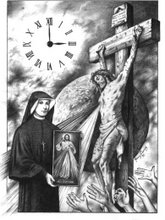Jesus Rose from the Dead? Prove It!
4/4/2007
The Catechism and proofs for the Resurrection
"If Christ has not been raised, then our preaching is in vain and your faith is in vain" (1 Cor. 15:14).
Easter, the high point of the Christian year, brings opportunities to witness to the truth of the Resurrection of Our Lord. With the eyes of faith, it is possible to see the Resurrection as a historical fact. That believers see it as a fact, though, does not necessarily mean that it can be empirically proven. In fact, the Catechism teaches that while rational proofs can be helpful, the faith is passed on through witnesses with the help of the Holy Spirit.
There are a number of "proofs" we can employ that give a defense for the hope that is in us (cf. 1 Pet. 3:15). We might show people that we’re not crazy for believing. We might show people that they wouldn’t be crazy for believing. The more ambitious might even use proofs in an attempt to convert others. While proofs are helpful, they can take us only so far.
What moves us to believe is not the fact that revealed truths appear as true and intelligible in the light of our natural reason: we believe "because of the authority of God himself who reveals them, who can neither deceive nor be deceived." So "that the submission of our faith might nevertheless be in accordance with reason, God willed that external proofs of his Revelation should be joined to the internal helps of the Holy Spirit." (Catechism, no. 156).
For an example of proofs, we can look to St. Thomas Aquinas’ five ways in which man can come to know the existence of God. These proofs are paths of reasoning that can be helpful in disposing a person—softening his heart—toward the work of the Holy Spirit. As the Catechism says,
Man’s faculties make him capable of coming to a knowledge of the existence of a personal God. But for man to be able to enter into real intimacy with him, God willed both to reveal himself to man, and to give him the grace of being able to welcome this revelation in faith. The proofs of God’s existence, however, can predispose one to faith and help one to see that faith is not opposed to reason. (Catechism, no. 35)
So man is capable of reasoning to the existence of God. In fact, St. Thomas teaches that the existence of God, because it "can be known by natural reason," is not an article of faith (Summa Theologica, I.2.2). St. Thomas teaches that the Resurrection, on the other hand, is an article of faith: "Some things come to our knowledge by nature’s common law, others by special favor of grace, as things divinely revealed" (Summa Theologica, III.55.1).
This is important for our understanding of the use of proofs. We can lead people to see that an article of faith, in this case the Resurrection, is reasonable, but revelation is also received in faith, passed down by witnesses. The Catechism says:
But no one was an eyewitness to Christ’s Resurrection and no evangelist describes it. No one can say how it came about physically. Still less was its innermost essence, his passing over to another life, perceptible to the senses. Although the Resurrection was an historical event that could be verified by the sign of the empty tomb and by the reality of the apostles’ encounters with the risen Christ, still it remains at the very heart of the mystery of faith as something that transcends and surpasses history. This is why the risen Christ does not reveal himself to the world, but to his disciples, "to those who came up with him from Galilee to Jerusalem, who are now his witnesses to the people." (Catechism, no. 647)
Thus, as St. Thomas said, it is the nature of the Resurrection not to be subject to proofs and known by natural reason, but is "beyond the common ken of mankind." Instead, the Resurrection was revealed by Christ to a few witnesses "by whose testimony it could be brought to the knowledge of others."
http://www.cuf.org/news/newsdetail.asp?newID=171
Sunday, April 15, 2007
Subscribe to:
Post Comments (Atom)

1 comment:
Some interesting content on this post particularly. I might consider commenting on this subject.
http://kakistocrat.blogsome.com/
Post a Comment